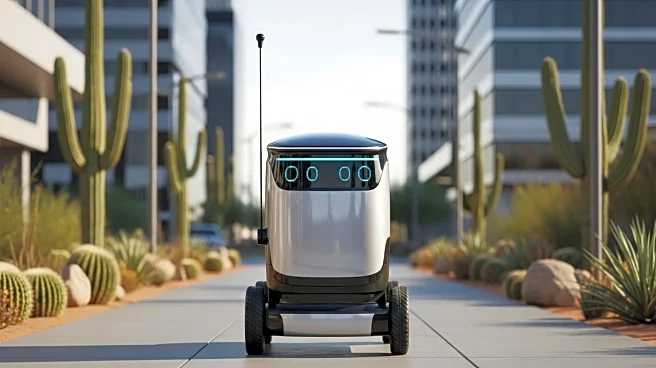What is the story about?
What's Happening?
DoorDash has launched its first commercial autonomous delivery robot, named Dot, in Arizona. Developed by DoorDash Labs, Dot is designed to navigate bike lanes, roads, sidewalks, and driveways, aiming to accelerate local commerce. The robot is part of DoorDash's new Autonomous Delivery Platform, which integrates Dashers, robots, drones, and other autonomous vehicles to optimize delivery methods based on speed, cost, and location. Dot is all-electric, one-tenth the size of a car, and can reach speeds of up to 20 mph. The robot is engineered for short neighborhood trips, reducing congestion and emissions while providing a safer, contact-free delivery option. An early access program is launching in Tempe and Mesa, Arizona, marking the beginning of Dot's commercial deployment.
Why It's Important?
The introduction of Dot represents a significant step in the evolution of delivery services, potentially transforming local commerce by offering a more efficient and environmentally friendly delivery option. This development could reduce reliance on traditional delivery vehicles, thereby decreasing traffic congestion and emissions. For DoorDash, integrating autonomous technology into its logistics network could enhance operational efficiency and reduce costs. The move also highlights the growing trend of automation in the delivery industry, which could impact employment for human delivery drivers. However, DoorDash emphasizes that human Dashers will continue to handle the majority of deliveries, focusing on high-value orders that require human judgment and care.
What's Next?
DoorDash plans to expand the Dot program beyond Arizona into other markets as it continues to build a multi-modal delivery network. The company aims to refine its Autonomous Delivery Platform, potentially increasing the role of autonomous technology in its operations. Stakeholders such as local governments and businesses may react to the deployment of delivery robots, considering regulatory and infrastructure adjustments. The success of Dot's pilot program in Arizona could influence the adoption of similar technologies by other companies in the delivery industry.
Beyond the Headlines
The deployment of autonomous delivery robots like Dot raises ethical and legal questions regarding safety, privacy, and employment. As these robots become more prevalent, there may be discussions about the impact on jobs traditionally held by human delivery drivers. Additionally, the integration of AI-powered dispatch systems could lead to concerns about data privacy and the security of personal information. The cultural acceptance of robots in everyday life may also evolve as they become more common in public spaces.
















